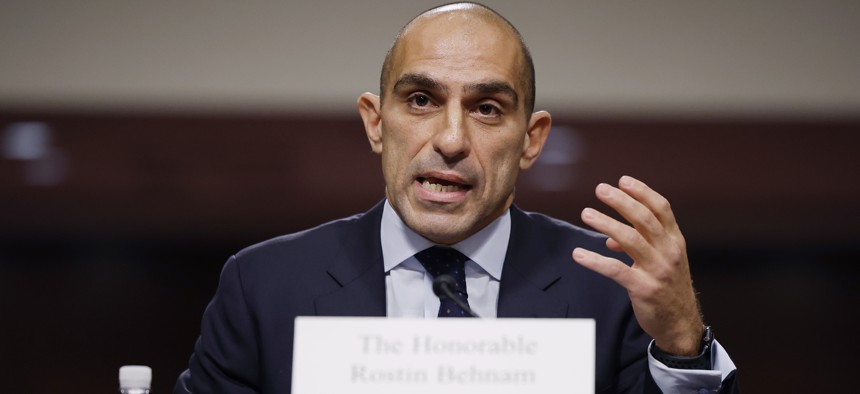Lawmakers Discuss Crypto Regulatory Bill Following FTX Collapse

WASHINGTON, DC - DECEMBER 01: Commodity Futures Trading Commission Chairman Rostin Behnam testifies about the collapse of the cryptocurrency exchange company FTX before the Senate Agriculture, Nutrition and Forestry Committee in the Dirksen Senate Office Building on Capitol Hill on December 01, 2022 in Washington, DC. In his first public comments since his business collapsed, Sam Bankman-Fried told the New York Times Wednesday that management and accounting failures were the reason for the collapse of his $32 billion company, which has sparked civil and criminal investigations. Chip Somodevilla /Getty
Members on the Senate Agriculture Committee consider applying classic market restrictions to the digital asset marketplace with financial regulators.
Congress has begun delving into what went wrong with cryptocurrency trading platform FTX and how to prevent future widespread financial disaster within the digital asset trading landscape. Rostin Behnam, the commissioner of the Commodity Futures Trading Commission, offered his perspective before the Senate Agriculture Committee on Thursday.
Committee members and Behnam focused on consumer protections in the unregulated cryptocurrency market and where pending legislation and federal policy should be headed to prevent the financial fallout and alleged fraud that occurred when FTX––along with 130 connected companies––filed for bankruptcy amid a liquidity crisis.
“We are here today because many Americans invested in a novel product and will likely lose money because digital asset markets lack the basic protections that we have all come to expect and have made American financial markets the envy of the world,” Behnam testified. “In the absence of stringent and uniform standards, the digital asset market rapidly expanded with nominal barriers to entry for new products and new consumers. Massive speculative interest has taken the place of legitimate market forces, putting the American public at significant risk.”
Ranking Member Sen. John Boozman, R-Ark., asked how hypothetical oversight from the CFTC could have prevented the collapse of FTX and saved retail investors’ money. Behnam said that his agency would have needed authority to oversee company business operations if they are a registered exchange.
“If we have that authority, and they [FTX] were registered, given what we know from the facts about conflicts of interest, commingling funds, books and records, we would have been able to prohibit it,” he said.
Both Boozman and Behnam voiced support for the development of a federal regulatory framework that emphasizes financial reporting and transparency within digital asset trading firms.
Committee members also heavily discussed the details of the Digital Commodities Consumer Protection Act, a bill sponsored by committee Chairwoman Sen. Debbie Stabenow, D-Mich., which is cosponsored by fellow committee members.
Introduced into the Senate back in August, the bill brings standard financial market regulations, such as reserve requirements and conflict of interest procedures, to cryptocurrency and digital asset trading spaces. The hearing focused on filling in any outstanding regulatory gaps in the bill in the wake of the FTX collapse.
“I think given what we've learned and certainly what has happened in the past few weeks, we have to take a fresh look to ensure that whatever happened at FTX cannot happen again and that the DCCPA has tightened up to ensure that there are no holes and no gaps in the regulation and that we ensure customer money is safe and that no illicit activity or fraud could occur,” he said.
Notably, the DCCPA would grant the CFTC jurisdiction over digital asset trading aside from retail buying and selling transactions. In response to Sen. Sherrod Brown, D-Ohio, Benham said that his agency is looking to close loopholes digital asset companies can exploit that put retail investors at risk.
“There's been, you know, a narrative about a power grab,” Benham said. “This is the farthest thing from it. It is about filling a gap and doing what we can do as a commodity market regulator to fill the gap, to protect customers and to prevent us from having to be here again, talking about another bankruptcy.”






